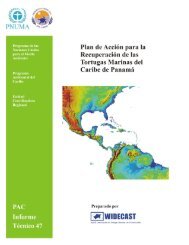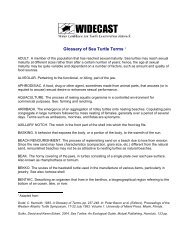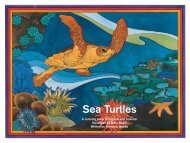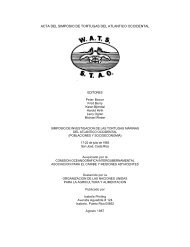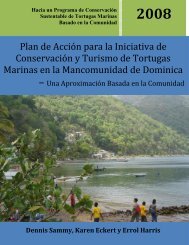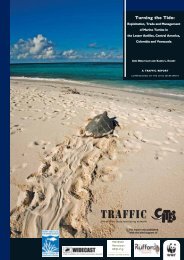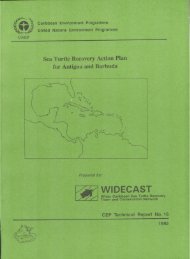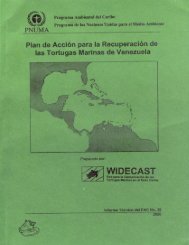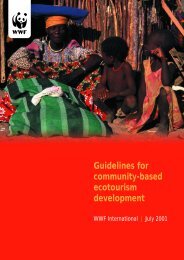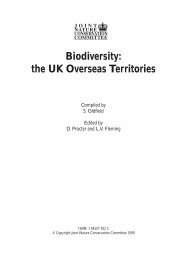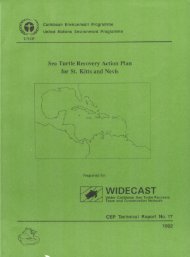Sea Turtle Recovery Action Plan for Barbados - WIDECAST
Sea Turtle Recovery Action Plan for Barbados - WIDECAST
Sea Turtle Recovery Action Plan for Barbados - WIDECAST
You also want an ePaper? Increase the reach of your titles
YUMPU automatically turns print PDFs into web optimized ePapers that Google loves.
CEP Technical Report No. 12<br />
mong the judiciary may assist the ef<strong>for</strong>ts of the Royal <strong>Barbados</strong> Police Force to en<strong>for</strong>ce<br />
environmental legislation. The Fisheries Division, recognizing that the turtle preservation<br />
section of the Fisheries Legislation Act is presently both inadequate to deter poaching and<br />
difficult to en<strong>for</strong>ce, is advising prohibition of sea turtle harvesting within the jurisdiction of<br />
<strong>Barbados</strong>. This proposal is strongly supported by this <strong>Recovery</strong> <strong>Action</strong> <strong>Plan</strong>.<br />
Atherley (1987) identifies problems with the legislation pertaining to the coastal zone as<br />
it presently stands and makes suggestions <strong>for</strong> improvement. A primary problem is that in the<br />
absence of local statutes governing specifically identified sensitive areas, such as seriously<br />
eroding beaches, Common Law gives owners the right to defend their seaward boundaries and to<br />
claim naturally accreted land as part of their own property. Accretion at one site as a result of<br />
groynes and sea defenses usually means erosion of property elsewhere. Present legislation<br />
contained in the Town <strong>Plan</strong>ning Act makes it illegal to erect such structures without permission<br />
from a central advisory body. However, terms such as "<strong>for</strong>eshore" and "high water mark" need<br />
to be clearly defined and standardized from one law to the next in order <strong>for</strong> the legislation to be<br />
effective.<br />
Page 24<br />
4.23 Propose new regulations where needed<br />
It is the recommendation of this <strong>Recovery</strong> <strong>Action</strong> <strong>Plan</strong> that the present legislation<br />
protecting juvenile and adult sea turtles, as well as sea turtle eggs, should be expanded to a<br />
moratorium with large fines <strong>for</strong> violators. The present penalties are wholly inadequate. The<br />
fisheries legislation has been re-drafted and is presently being considered by Cabinet. The<br />
proposed legislation will give full protection to all species of sea turtles and their eggs and<br />
prohibit the use of trammel or entangling nets in <strong>Barbados</strong> waters. Penalties will be increased<br />
substantially over current levels. It is also important <strong>for</strong> <strong>Barbados</strong> to accede to CITES in order to<br />
rein<strong>for</strong>ce planned improvements to national legislation with international trade restrictions on sea<br />
turtles and their products. Accession to CITES will restrict the import and export of turtle meat<br />
and products into and out of <strong>Barbados</strong> (see section 4.31).<br />
4.231 Eggs<br />
Although current regulations are theoretically sufficient to protect sea turtle eggs (harvest<br />
is illegal at all times), the penalty is inadequate to serve as a deterrent. As part of holistic turtle<br />
preservation legislation, there must be an increase in the penalty incurred <strong>for</strong> egg poaching.<br />
Eggs need protection from beach erosion. In this context, existing coastal zone<br />
legislation concerning beachfront development must be en<strong>for</strong>ced. Many contemporary<br />
development practices serve to exacerbate erosion and promote beach loss (section 3.1). Trees<br />
with a circumference of >1 m measured 1 m from the ground are protected in the Trees<br />
(Preservation) Act 1981, but additional legislation to protect beach vegetation such as sea grape<br />
and crab grass from clearance is necessary. The removal of beach vegetation accelerates erosion<br />
and can precipitate the loss of sea turtle nests.<br />
Eggs need protection from beach compaction. This can be achieved through temporarily<br />
fencing off nests, digging up nests at the end of incubation to release hatchlings, or carefully



